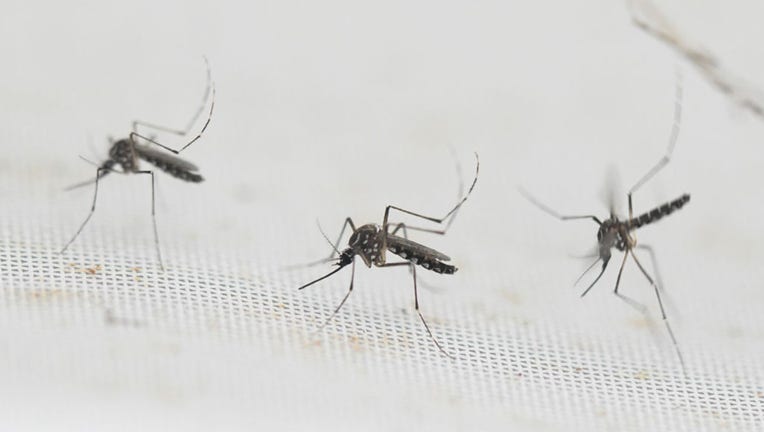Dengue epidemic declared by Puerto Rico amid spike in virus cases

FILE - Aedes aegypti mosquitoes are pictured at a laboratory of the Center for Parasitological and Vector Studies (CEPAVE) of the national scientific research institute CONICET, in La Plata, Buenos Aires Province, Argentina, on March 26, 2024. (Photo
SAN JUAN, Puerto Rico - Puerto Rico has declared an epidemic after a spike in dengue cases, a mosquito-borne virus that’s been on the rise in the Western Hemisphere.
The U.S. territory, home to 3.2 million people, has reported at least 549 cases so far this year, compared with a total of 1,293 cases for all of last year.
The majority of cases have been reported in Puerto Rico’s capital of San Juan.
More than 340 people have been hospitalized for the mosquito-borne virus, according to the island’s health department. Puerto Rico last declared a dengue epidemic in 2012.
What is dengue fever?
Dengue fever is a tropical disease caused by a virus carried by mosquitoes. Specifically, it’s caused by four similar viruses spread by mosquitoes of the genus Aedes, which are common in tropical and subtropical areas of the world.
About one in four people who are infected with dengue will get sick, according to the U.S. Centers for Disease Control and Prevention. Mild symptoms can include fever, nausea, vomiting, rash, and aches and pains and typically last anywhere from two to seven days.
Most people will recover after about a week, the CDC says.
For about one in 20 people who get sick with dengue, it can develop into a severe case, according to the agency – including shock, internal bleeding, and even death.
Infants and pregnant women are at higher risk of developing severe dengue.
The CDC says the best way to prevent dengue is by avoiding mosquito bites. A dengue vaccine is approved for use in some children who live in areas where dengue occurs frequently.
The vaccine, however, is not approved for use by U.S. travelers who are visiting but not living in an area where dengue is common.
Hotter temperatures cause dengue virus to flare
More than 5 million dengue cases were reported worldwide last year, with nearly 80% of them occurring in the Western Hemisphere, according to the World Health Organization.
The region has reported some 3 million cases so far this year, with health officials noting that higher rainfall along with humidity and heat linked to climate change have contributed to a rise in cases.
"This year is the year we’ve been seeing the most dengue in recorded history," Thais dos Santos, adviser on surveillance and control of arboviral diseases with the Pan American Health Organization, the regional office of the World Health Organization in the Americas, told the Associated Press in December.
She noted that record keeping began in 1980.
"Vector borne diseases, especially these diseases that are transmitted by mosquitoes … provide us a really good sentinel of what is happening with climate change," Dos Santos added.
Poor sanitation and a lack of robust health systems have also contributed to a rise in cases, but experts say droughts and floods linked to climate change are causing greater transmission of the virus, with stored water and heavy rains attracting mosquitoes.
Dr. Gabriela Paz-Bailey, chief of the dengue branch for the CDC in Puerto Rico, previously noted that higher temperatures also are extending the mosquito’s habitat and helping the virus develop faster inside the mosquito, leading to higher viral loads and higher probability of transmission.
Last year’s Northern Hemisphere summer was the hottest ever, with August some 1.5 degrees Celsius (2.7 degrees Fahrenheit) warmer than pre-industrial averages.
This story was reported from Cincinnati. The Associated Press contributed.

